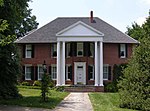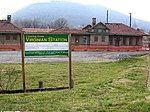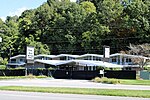South Roanoke, Roanoke, Virginia
Neighborhoods in Roanoke, VirginiaShenandoah Valley, Virginia geography stubs

South Roanoke is a neighborhood located in southeast Roanoke, Virginia, surrounded roughly by the Roanoke River to the north and Mill Mountain to the east, centered on Crystal Spring Avenue. It borders the neighborhoods of Southern Hills on the south, South Jefferson on the north, and Mill Mountain on the east and Franklin-Colonial on the west.
Excerpt from the Wikipedia article South Roanoke, Roanoke, Virginia (License: CC BY-SA 3.0, Authors, Images).South Roanoke, Roanoke, Virginia
Carolina Avenue Southwest, Roanoke
Geographical coordinates (GPS) Address Nearby Places Show on map
Geographical coordinates (GPS)
| Latitude | Longitude |
|---|---|
| N 37.244722222222 ° | E -79.952222222222 ° |
Address
Carolina Avenue Southwest 2652
24014 Roanoke
Virginia, United States
Open on Google Maps








